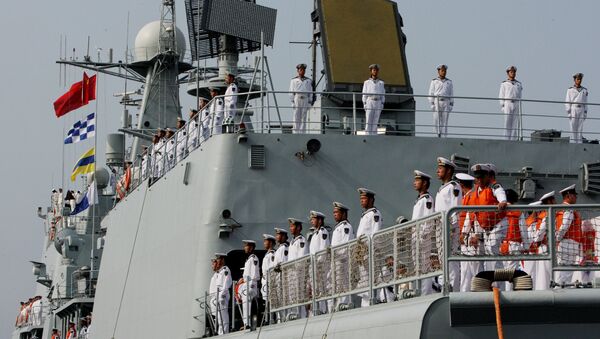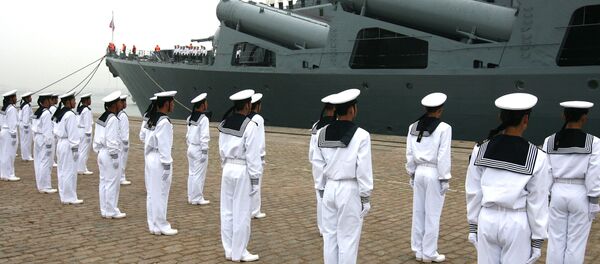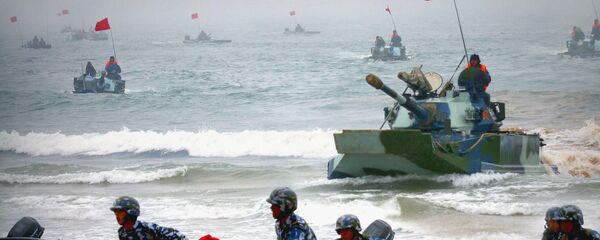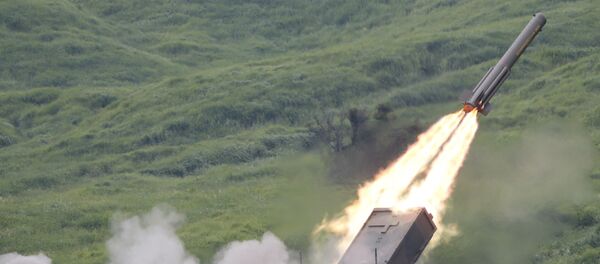Since the late 19th century Washington has pursued the objective to have a 'navy second to none'; the United States had outstripped Great Britain as the "naval hegemon" and has long maintained unchallenged naval dominance.
However, it seems that the US Navy's established status quo may soon be shaken up, American-German researcher, historian and strategic risk consultant F. William Engdahl believes.
"Taken together, the significant Russian naval experience during the Cold War combined with the ambitious Chinese expansion and creation of a modern blue water navy challenge US domination of the world seas as never before," the researcher notes in his article for New Eastern Outlook, warning the Pentagon planners against bullying the Dragon and the Bear.
The active phase of the drills included 22 vessels, 20 aircraft, 40 armored vehicles and 500 marines.
It should be noted, however, that China and Russia have repeatedly dismissed the assumption regarding a potential Sino-Russian military alliance.
"As for the far-fetched idea of an emerging China-Russia military alliance, it seems that only the most insensible ones could buy," Wang Haiqing of Xinhua remarked on August 20, 2015.
In October Russia's Rear Admiral Viktor Kochemazov told the Ekho Moskvy radio station that the Russian fleet would continue to participate in joint naval exercises with China in 2016.
"Next year, the decision was already made by the Defense Ministry, we will continue to participate in these Joint Sea drills. This time China will be the host and at its invitation the Pacific Fleet will go to China," Rear Admiral Kochemazov elaborated.
Meanwhile, Beijing announced that it was in negotiations with the government of the Republic of Djibouti to establish a Chinese naval base there.
Djibouti is "one of the world's most strategically placed" nations, Engdahl stresses, adding that it would be China's first-ever foreign naval base.
"China's first-ever foreign naval base is being negotiated in Djibouti, one of the most important water routes for world oil and trade flows to China," he explains.
Although the Chinese installation in Djibouti is a tiny facility compared to the American permanent base located there, its geopolitical significance for China and for US longstanding naval supremacy is far larger, according to the researcher.
Citing Vasili Kashin, a Chinese military expert with the Moscow-based Center for Analysis of Strategies and Technologies, Engdahl emphasizes that China is becoming a "full-fledged naval great power."
"The US and China, major powers with a minor footprint, are both poised for much deeper and more direct involvement in African affairs," American journalist James Poulos notes in his piece for The Week.
"…as China sets up shop in Djibouti, the US finds itself restricted to that country for its eastern African operations — a precarious toehold in a competitive environment," Poulos underscores.
Furthermore, China is seemingly determined to beef up its maritime presence amid the Pentagon's provocations in the South China Sea.
On December 31, 2015, China's People's Daily reported that Beijing is building its second aircraft carrier that would be a base for J-15 fighters and other types of aircraft.
#BREAKING China's second aircraft carrier is under construction: Ministry of National Defense pic.twitter.com/YPZUiIzVcT
— People's Daily,China (@PDChina) 31 декабря 2015
The Russian and the Chinese modernization programs may shift the established status quo and topple the US as an unchallenged naval hegemon, the researcher concludes.





